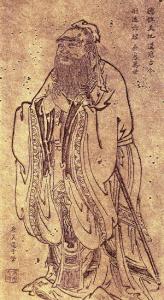By some forms of reckoning it was on this day, the 28th of September in the year 551 before our common era, that the sage Kǒng Fūzǐ, “Master Kǒng,” or commonly 孔子; Kǒngzǐ, or to most of us, Confucius was born.
I am not regular in noting this day as it rolls around, but I think it important, and I try to do so. Each time I do I add a little information in the noticing. It’s getting a bit layered, and perhaps will be helpful as well as interesting. He is, after all, one of the most interesting of spiritual teachers.
Confucus was born in what today is Qufu in China. His father died when he was three and he was raised by his mother. While the family was in the class situated between commoners and aristocracy, his family was extremely poor. Still, there was a school available to him and he took full advantage of the opportunity. At nineteen he married Qigun. They had a son and two daughters.
He held various jobs to support himself and his family. Eventually, his vast erudition and his teachings on deportment and righteousness attracted the attention of the leading families. In 501 he received his first appointment in government as governor of a small town. He would eventually rise to Minister of Crime within the independent state of Lu.
He lived in tumultuous times. Frustrated at the intrigue within his own country he resigned his post and as an exile visited several courts where he was invited to speak. But, his vision for a government rooted in an ethic of mutuality and respect for family and tradition was never implemented. He returned home where he led an informal school. Having outlived his son and one daughter he died at either 71 or 72.
The Stanford Encyclopedia of Philosophy tells us: “His teachings, preserved in the Lunyu or Analects, form the foundation of much of subsequent Chinese speculation on the education and comportment of the ideal man, how such an individual should live his life and interact with others, and the forms of society and government in which he should participate. Fung Yu-lan, one of the great 20thcentury authorities on the history of Chinese thought, compares Confucius’ influence in Chinese history with that of Socrates in the West.”
A figure of enormous importance in the development of Chinese civilization.
There’s a lot of conversation in the Western Zen community about how important Taoism is in the development of the tradition. For most of the Twentieth century there was a romantic assertion that Indian Buddhism met Chinese Taoism, they, um, got together. And their love child was Zen.
The truth is Zen is a Chinese Buddhist school, and among other things there are elements of Taoism, at least broadly stylistic elements that flavor Zen. But, in fact Zen owes more to Confucianism than any other specific Chinese features. Although its probably best to say Zen is Buddhism with Chinese characteristics.
As a small footnote Confucius’ family continues to this day. One of his descendants H. H. Kung was Premier of the Republic of China. Wikipedia tells us “Despite repeated dynastic change in China, the title of Duke Yansheng was bestowed upon successive generations of descendants until it was abolished by the Nationalist Government in 1935.
The last holder of the title, Kung Te-cheng of the 77th generation, was appointed Sacrificial Official to Confucius. Kung Te-cheng died in October 2008, and his son, Kung Wei-yi, the 78th lineal descendant, had died in 1989.
Kung Te-cheng’s grandson, Kung Tsui-chang, the 79th lineal descendant, was born in 1975; his great-grandson, Kung Yu-jen, the 80th lineal descendant, was born in Taipei on January 1, 2006. Te-cheng’s sister, Kong Demao, lives in mainland China and has written a book about her experiences growing up at the family estate in Qufu. Another sister, Kong Deqi, died as a young woman. Many descendants of Confucius still live in Qufu today.”
Here is a version of the Analects. And, following an audio book…
From Buddhism’s introduction into China there began a dialogue with the two great indigenous religions, Taoism, and Confucianism. There would be periods of assimilation, contrast, conflict, sometimes bitter, and all along the way synthesis. Eventually the idea of the Three Teachings would emerge.
One thing I’m aware of as a person on the Zen way is how the Buddhism that touches my heart formed in the crucible of early Medieval China. And within that cauldron, a major, major part was Confucianism. At the edges of the important things, Zen’s teaching of lineage and dharma transmission has Confucian fingerprints all over it. For good, and for ill…
Today in the West as those of us who follow the Zen way find ourselves in a liminal moment, with our own issues of assimilation, contrast, conflict, much of it bitter; we find enormous possibilities. As one example, the Western Soto Zen priest, Daishin McCabe offers a delightful appreciation.
Or, perhaps this talk by the Zen priest Edward Sanshin Oberholtzer.
All part of a conversation that will continue for some time to come, I suspect…













